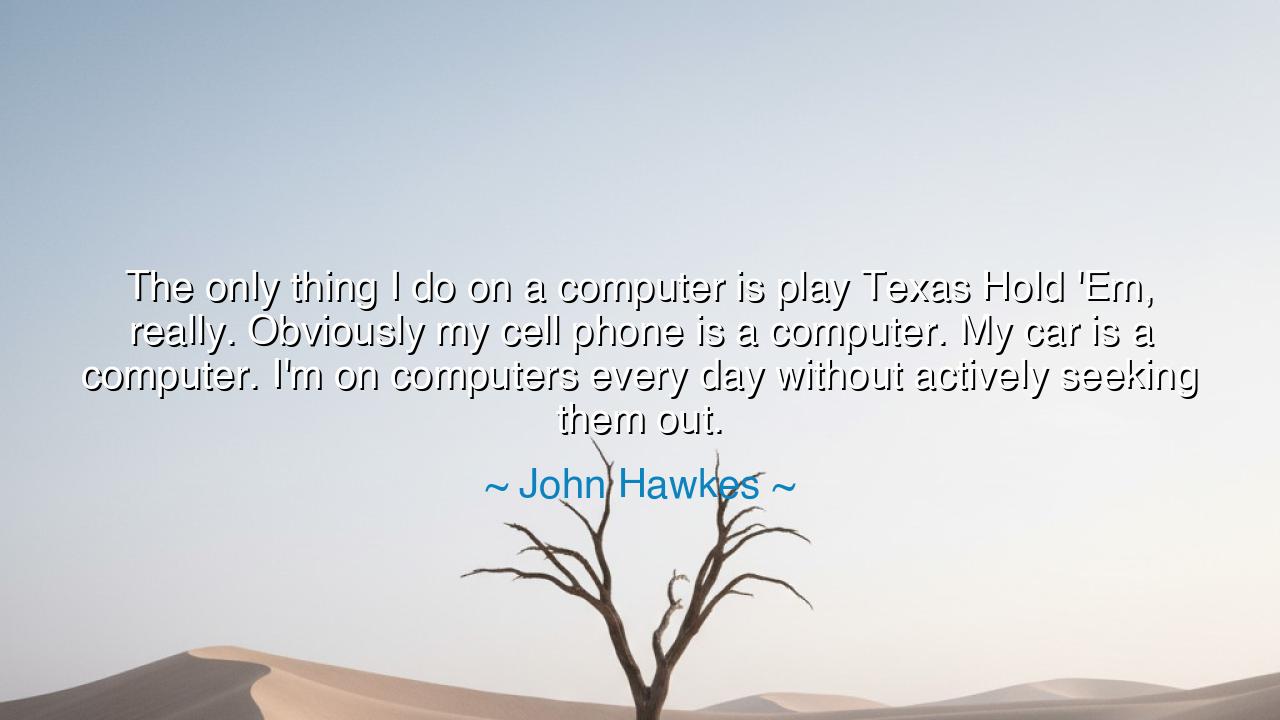
The only thing I do on a computer is play Texas Hold 'Em, really.
The only thing I do on a computer is play Texas Hold 'Em, really. Obviously my cell phone is a computer. My car is a computer. I'm on computers every day without actively seeking them out.






“The only thing I do on a computer is play Texas Hold ’Em, really. Obviously my cell phone is a computer. My car is a computer. I'm on computers every day without actively seeking them out.” — with this simple confession, John Hawkes captures one of the quietest yet most profound truths of our age: that we are surrounded, even immersed, in the digital world, whether or not we choose it. His words are not about poker, nor even about machines — they are about modern dependency, the invisible web of technology that has woven itself into every breath of daily life.
In ancient times, humanity built temples and towers to reach the divine. Today, we build circuits and systems, and through them, we have extended our minds across the earth. Yet Hawkes reminds us that these creations, while wondrous, have become ubiquitous, surrounding us so completely that they no longer feel separate. He says he does not seek computers, yet they find him — in his hand, in his pocket, on the road before him. His reflection is not complaint, but recognition: the world has changed, and we now dwell in the house of the machine.
The tone of his words carries both humor and melancholy. There is irony in his simplicity — “the only thing I do on a computer is play Texas Hold ’Em” — a gentle protest in an age of constant connection. It is as if he longs for a smaller world, a slower rhythm, where the hum of life was not so entangled with the hum of code. He is not rejecting progress; he is simply noticing its quiet conquest. What began as a tool to serve humanity has become a constant companion, a shadow that never leaves.
Consider the story of Henry David Thoreau, who retreated to Walden Pond to live deliberately, to see what was essential and what was not. In his time, it was the Industrial Revolution that filled the world with noise and motion. He sought stillness — and in doing so, became a prophet of simplicity. In our time, it is the digital revolution that has conquered silence. We, too, must learn to find our modern Walden — a space, even within the network, where thought breathes freely and not through the machine.
Hawkes’ reflection reveals something deeper: that technology has become invisible, not because it is small, but because it is everywhere. When our car, our watch, and even our home have minds of their own, what remains truly human is not our intelligence, but our awareness. The danger lies not in the presence of machines, but in our forgetfulness — when we no longer notice that we live among them, when our hands move and our minds drift in sync with circuits we did not build and cannot control.
There is also a quiet irony in the game of Texas Hold ’Em itself. It is a game of chance, strategy, and risk — a dance between intuition and calculation. In playing it, Hawkes mirrors the balance we all face: man versus machine, instinct versus algorithm. Life in the modern world is its own high-stakes game, where we must remember that the cards of the heart are not dealt by computers, but by the choices we make, moment by moment, beyond the screen.
The lesson in his words is not one of rejection, but of remembrance. We must learn to live with our machines, not within them. Let technology serve the rhythm of human life, not replace it. Use your phone, your car, your screen — but do not let them use you. For if you forget to look up from the light of the device, you may one day realize that the stars have faded, not from the sky, but from your sight.
So let us walk wisely in this world of silent circuitry. Let us touch the earth, speak face to face, listen to the wind without earbuds in our ears. Be aware, as Hawkes was, that we are surrounded by computers — yet still free to choose how deeply we let them enter our souls. The machines are everywhere, yes — but the spirit, the laughter, the warmth of human presence still belong to us. Guard them well, for they are what make life real.






AAdministratorAdministrator
Welcome, honored guests. Please leave a comment, we will respond soon